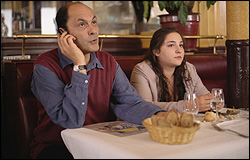Velvet ropes define the witty and insightful Look at Me (which opens Friday, April 15, at the Seven Gables). On one side stands the Cassard clan: famous author and publisher Étienne (co-writer Jean-Pierre Bacri), escorted by his young, thin, blond second wife, and trailing his rather zaftig, insecure 20-year-old daughter, Lolita (Marylou Berry), somewhere in his glamorous slipstream. On the other are the Millers: voice coach Sylvia (director and co-writer Agnès Jaoui) and her husband, Pierre (Laurent Grévill), a struggling novelist. Étienne carries his clout with brusque authority; he’s a heavyweight in the Parisian cultural establishment. Of course, the notion of a writer being a celebrity of such stature is foreign to us, but this is the kind of film where parties are thrown for good book reviews and a scene slows down to linger over a game of chess. Changing publishers is a major plot point, and the movie ends with a recital.
The closest American equivalent to this milieu would be a Woody Allen film. The important distinction is that this film actually matters, actually works, unlike anything Allen has done in years. Jaoui, whose excellent 2001 The Taste of Others is available on DVD, starts out her story with a proposition, and she finishes with its proof. Étienne is the sun for those in his awed orbit, favoring them with glimmers of fame and validation; and it’s those just outside of his ego field, like Sylvia and Pierre, who are most susceptible to its gravitational pull. Those inside, like Lolita and her stepmother, resent being crushed by it.
Not that Étienne is the only one suffering from excessive self-absorption. In their lessons, Sylvia tells Lolita, “You’re listening to yourself. Don’t be stuck on yourself.” She’s being harsh and honest, but she’s not yet aware of her pupil’s famous father, whom she reveres. It’s easier to sing the praises of pure, egoless art when you’re not tempted into a privileged world of logrolling, sycophancy, and career advancement.
Lest it sound too snooty and, well, French in its intellectual concerns, Look at Me is set—again, unlike a Woody Allen movie—in a recognizable world where even intellectuals do recognizable things. Boorish and overbearing, Étienne halts all conversation in a restaurant or party for his constantly ringing cell phone. (That he sets it on the buzzing “silent” mode is even more precious—he’s too cultured for it to ring out loud, but too important to miss a call.) Sylvia rapidly goes from aloof aesthete to insider acolyte when Pierre’s sudden success lifts them into Étienne’s social whirl; being invited to his weekend home is, for you or me, like a summons from Brad and Jennifer to Malibu. Meanwhile, poor Lolita cries her eyes out like a teenager by falling for boys who use her to get to her father; she’s smart enough to know better, weak enough to consent.
Jaoui and Bacri’s script won a prize at Cannes last year because of its mirror to life—this is how people really behave when swayed by flattery and fame—and because that mirror magnifies such small, telling things. The movie opens with Lolita trying to give her father a cassette tape of her singing Schubert; every parent will recognize the insistent tug: “Pay attention to me, Daddy.” Who of us hasn’t said “later” without any such intention? At his weekend home, Étienne has his favorite dish of rabbit prepared, then asks his guests, “You all like rabbit, don’t you?” Oh, sure, Mr. Pitt and Ms. Aniston—it’s our favorite! Who of us hasn’t gone along in the same way?
The tone of Look at Me is light and lifelike, but it’s less an outright comedy than The Taste of Others. (There, Bacri was more the clown.) Scenes jump forward over the course of six months without much explaining between. Jaoui and Bacri trust you to fill in the gaps between those little clues, like the cassette tape, that turn out not to be so little. So it is with Lolita’s lost coat, which leads her to unemployed young journalist Sébastien (Keine Bouhiza), who turns out to understand her father—and stand up to him—better than anyone in her family. And Pierre, from his meek, insecure seeds, grows into something more prominent and despicable under Étienne’s influence; he finds his fitting punishment on a TV talk show, surrounded by models with fake boobs and cowboy hats.
LOOK AT ME is an essentially musical film. In common with The Taste of Others, all the characters are striving for a kind of unison, a melody. The movie really stops to admire musical performances, like Almodóvar’s Talk to Her. Sylvia tells Lolita, “Take your space,” while performing onstage—in other words, find your voice; don’t sing to somebody else’s tune. One of the movie’s pleasures is how Jaoui and Bacri insist on the same thing for all their characters. Some people, like Étienne, can’t be saved from their essential nature, while others— Sylvia, Lolita, Sébastien—have to be saved from repressing theirs. Even minor figures like Étienne’s second wife and his flunkyish assistant are given their minor dignity; it’s not just the music in this film that rewards closer inspection.
Jaoui and Bacri would have nothing, of course, without the monster who puts events into motion. At first, you almost admire Étienne’s confidence and laugh at his outrageous candor. It’s possible to understand why someone so powerful, yet oblivious to others, could draw otherwise rational people into his fold. In the end, they flee his sight.








